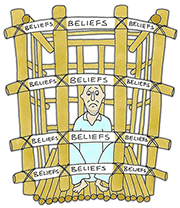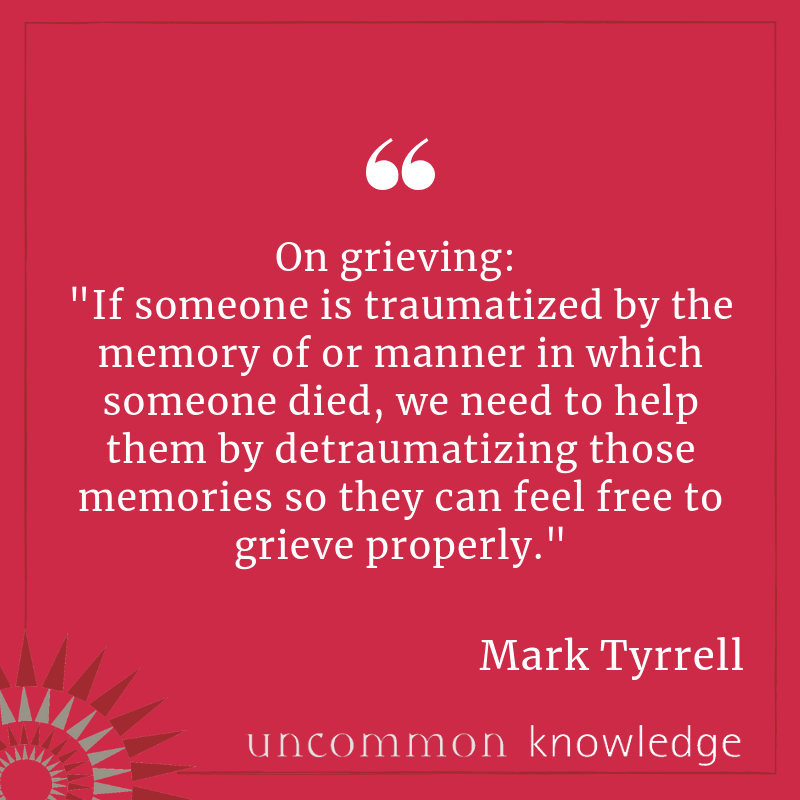
Often, a counsellor's job in grief therapy is just to stop the client getting stuck.
“Sorrow makes us all children again – destroys all differences of intellect. The wisest know nothing.” – Ralph Waldo Emerson
We live in a society where death is somewhat taboo.
Although there are many ways of comforting and supporting a grieving person, many people don’t know what to do or say when someone they know has experienced a loss.
So, just when your client needs support, understanding, and listening ears the most, they may find people avoiding them out of embarrassment and awkwardness.
Grieving the death of a loved one is of course entirely natural and not pathological in any way.
And while people say that there are different stages to grief, different people deal with grief in different ways. No one has to experience all of a particular set of emotions in any set order.
Prefer to watch instead?
Grief should only become a concern if it doesn’t start to diminish after some months and the grief-stricken person starts to believe that they cannot possibly have any meaningful existence without their deceased loved one.
Though we shouldn’t pathologize grief, it’s good for counsellors and therapists to help our clients stop it continually burdening their lives. Here are 3 guidelines:
1. Let them talk about the deceased
People often feel awkward about discussing a deceased person with someone who is bereaved, to the point that they won’t even mention the person’s name.
This is hard for the one who is grieving, as they often want and need to talk about their lost partner, friend, or relative.
If you are reasonably sure it won’t unnecessarily upset your client, ask about the dead person and encourage your client to talk about them and past times. Allow them to describe what the person they have lost was like: their foibles, their likes and dislikes, and even their weaknesses, if they come up.
You might also ask them how this person would have wanted them to be living now and even what advice or comfort they’d give right now if they could.
This may be the first time they have properly been able to pay tribute in words and have it accepted.
This is an excerpt from an Uncommon Practitioners’ TV training video.
2. Distinguish grief from trauma
This is potentially the most important of my grief counselling techniques.
You may hear clients say things like: “I just can’t think about them without that horrible image of them lying in the hospital!” or “All I see when I think of them is the way they looked when they were dead!”
And while someone is still experiencing flashbacks to the time they heard about the death of their loved one, found them dead, or saw them dying, the natural processes of grief don’t really get a chance to start, let alone run their course.
Of course, their corpse isn’t really the person or who they were, just as the way someone died is not their life.
I often reassure people through analogy, by talking about how
…the final punctuation mark at the end of the story isn’t the book itself – it’s just the way it ends…
and how
…you have all those different chapters full of events, adventures, and maybe illustrations. They are the real book, not that last punctuation mark. And when we think of a book, we take it as a whole, not just its final bit…
People tend to get the message more easily when we communicate metaphorically in this way.
But if someone is traumatized by the memory of or manner in which someone died, we need to help them by detraumatizing those memories so they can feel ‘free’ to grieve properly. The best way I’ve found to do this is through the Rewind Technique.
3. Deal with guilt and help them organize the grief
Guilt can be a real problem in grieving.
People will often feel guilty about stuff they did or didn’t do or say. Or they might feel bad because they are starting to grieve less intensely and are not always thinking about the person they have lost.
When a client is struggling with guilt that they’re not grieving ‘enough’, I’ll suggest that the best way to really honour someone’s life is to properly and fully live, yourself.
I also suggest that rest is an important part of doing anything well. An athlete needs to train hard and eat properly, of course. But in order to get better at what they do, they also have to not exercise sometimes and simply rest.
So you can let your client know they can grieve even better and, in a sense, more ‘purely’ if they start having breaks from it. They can allow themselves to forget their lost loved one ‘for a while’ so that they can actually remember the person better at other times.
For some people, we might suggest a ‘grieving day’ once a month (eventually to be once or twice a year). They can spend the whole day, or a predetermined portion of it, thinking about their loved one or maybe looking at pictures of them – honouring their life in whatever way seems appropriate.
This approach helps stop grief from continually intruding by providing an organized outlet and regular ritual.
And, eventually, help your client begin to look to a productive and – dare we suggest – fulfilling future. Because, as writer Jan Glidewell so eloquently said, “You can clutch the past so tightly to your chest that it leaves your arms too full to embrace the present.”
For more therapy tips, subscribe to Mark’s weekly newsletter.
Would you like to enhance your reframing skills?
Click here to read how my online course ‘Conversational Reframing’ shows you how to craft cunning reframes and slip them past your clients’ conscious criticisms.











